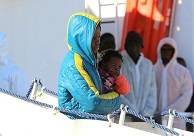UNHCR appeals for more resettlement after 160 reported Mediterranean deaths

UNHCR appeals for more resettlement after 160 reported Mediterranean deaths
UNHCR, 12 Jan 2018
This is a summary of what was said by UNHCR spokesperson William Spindler – to whom quoted text may be attributed – at today's press briefing at the Palais des Nations in Geneva.
UNHCR, the UN Refugee Agency is renewing its appeal to countries for help in saving human lives by offering more resettlement places and other safe alternatives to protection for refugees, including through family reunification. This week alone, some 160 people were reported dead or missing in three separate incidents in the Mediterranean.
On Monday (8 January), the survivors of an incident that may have claimed more than 60 lives were picked up by the Italian coastguard and disembarked in Catania. In addition to eight corpses recovered by the rescuers, 56 people, including 15 women and 6 children, are feared to have drowned.
On the same day, in a separate incident, a dinghy carrying 54 people capsized off Morocco. The Moroccan coastguard reported that two men had drowned.
On Tuesday (9 January), UNHCR and our partner, the International Medical Corps, assisted with the disembarkation in Tripoli of 279 refugees and migrants by the Libyan coastguard. The survivors reported that between 60 and 100 people were still missing at sea. No bodies have been found so far.
In September 2017, UNHCR appealed urgently for 40,000 resettlement places for refugees in 15 priority countries of asylum and transit along the Central Mediterranean route. In all, 277,000 refugees are estimated to be in need of resettlement in these countries.
Against these projected needs, UNHCR has to date received approximately 13,000 offers of resettlement places in 2018 and 2019. Most of these are part of regular established global resettlement programmes and only a few represent additional places.
Since November 2017, UNHCR has evacuated hundreds of vulnerable refugees, the vast majority children and women, from Libya to Niger. For unaccompanied children, a solution in the best interest of each child will be identified, while adults go through UNHCR regular processing with a view to identifying solutions for them, including resettlement.
UNHCR has been advocating for a comprehensive approach to address movements of migrants and refugees who embark on perilous journeys across the Sahara Desert and the Mediterranean. These efforts should include building or strengthening protection capacity and livelihood support in countries of first asylum, providing more regular and safe ways for refugees to find safety through legal pathways such as resettlement and family reunification, and addressing the root causes and drivers of refugee displacement.
For more information on this topic, please contact:
In Geneva, William Spindler, spindler@unhcr.org, +41 79 217 3011
In Geneva, Cécile Pouilly, pouilly@unhcr.org, +41 79 108 26 25
In Amman, Rula Amin, aminr@unhcr.org, +962 790 04 58 49
In Tunis, Paula Barrachina Esteban, barrachi@unhcr.org, + 216 20 697 641
In Italy, Federico Fossi, fossi@unhcr.org, +39 349 08 43 461
In Madrid, Maria Jesus Vega, vegam@unhcr.org, +34 670 661 263
UNHCR, the UN Refugee Agency is renewing its appeal to countries for help in saving human lives by offering more resettlement places and other safe alternatives to protection for refugees, including through family reunification. This week alone, some 160 people were reported dead or missing in three separate incidents in the Mediterranean.
On Monday (8 January), the survivors of an incident that may have claimed more than 60 lives were picked up by the Italian coastguard and disembarked in Catania. In addition to eight corpses recovered by the rescuers, 56 people, including 15 women and 6 children, are feared to have drowned.
On the same day, in a separate incident, a dinghy carrying 54 people capsized off Morocco. The Moroccan coastguard reported that two men had drowned.
On Tuesday (9 January), UNHCR and our partner, the International Medical Corps, assisted with the disembarkation in Tripoli of 279 refugees and migrants by the Libyan coastguard. The survivors reported that between 60 and 100 people were still missing at sea. No bodies have been found so far.
In September 2017, UNHCR appealed urgently for 40,000 resettlement places for refugees in 15 priority countries of asylum and transit along the Central Mediterranean route. In all, 277,000 refugees are estimated to be in need of resettlement in these countries.
Against these projected needs, UNHCR has to date received approximately 13,000 offers of resettlement places in 2018 and 2019. Most of these are part of regular established global resettlement programmes and only a few represent additional places.
Since November 2017, UNHCR has evacuated hundreds of vulnerable refugees, the vast majority children and women, from Libya to Niger. For unaccompanied children, a solution in the best interest of each child will be identified, while adults go through UNHCR regular processing with a view to identifying solutions for them, including resettlement.
UNHCR has been advocating for a comprehensive approach to address movements of migrants and refugees who embark on perilous journeys across the Sahara Desert and the Mediterranean. These efforts should include building or strengthening protection capacity and livelihood support in countries of first asylum, providing more regular and safe ways for refugees to find safety through legal pathways such as resettlement and family reunification, and addressing the root causes and drivers of refugee displacement.
For more information on this topic, please contact:
In Geneva, William Spindler, spindler@unhcr.org, +41 79 217 3011
In Geneva, Cécile Pouilly, pouilly@unhcr.org, +41 79 108 26 25
In Amman, Rula Amin, aminr@unhcr.org, +962 790 04 58 49
In Tunis, Paula Barrachina Esteban, barrachi@unhcr.org, + 216 20 697 641
In Italy, Federico Fossi, fossi@unhcr.org, +39 349 08 43 461
In Madrid, Maria Jesus Vega, vegam@unhcr.org, +34 670 661 263